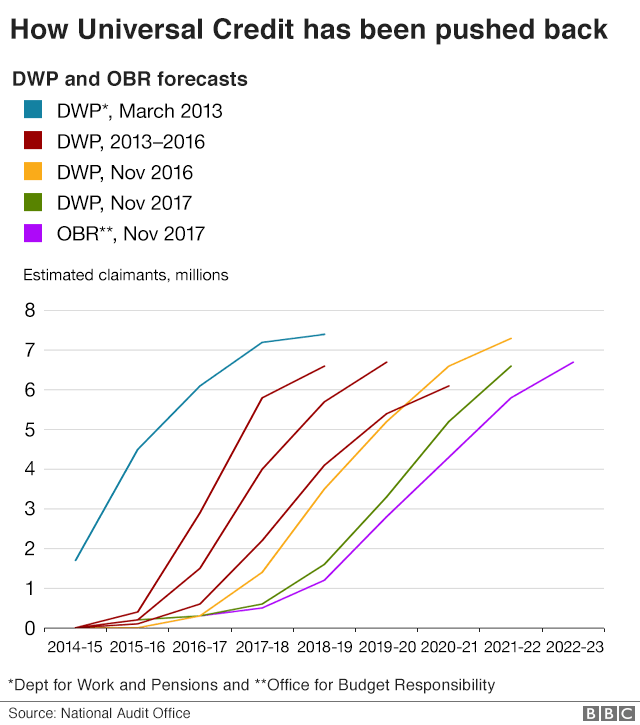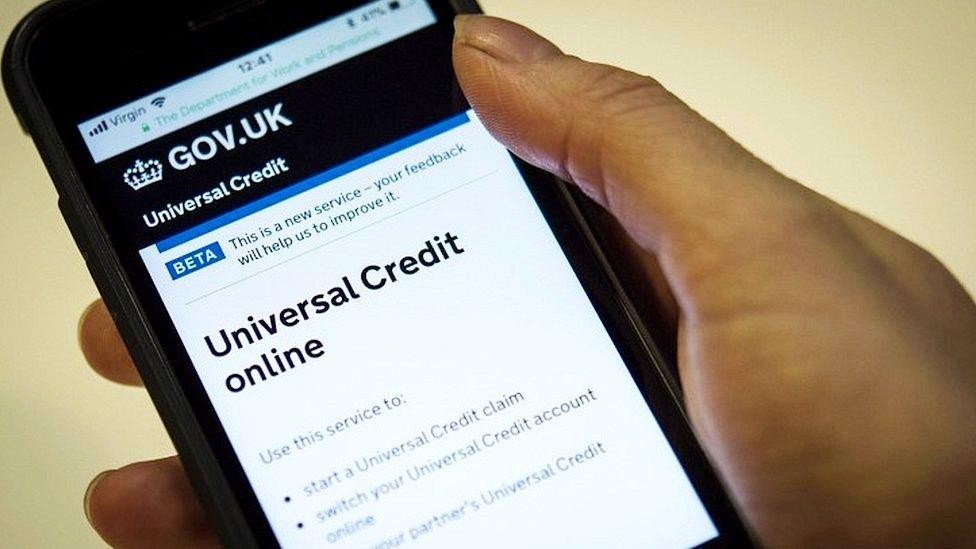Universal credit: Ministers 'in denial', MPs say
- Published

Universal credit is forcing more people to use food banks, the MPs said
The government has been accused of presiding over a "culture of indifference" about the hardship caused by universal credit.
A committee of MPs said "denial and defensiveness" by the Department for Work and Pensions was a significant risk to the flagship welfare reform.
Universal credit is leading to increased debt, rent arrears and food bank use, the MPs said.
The DWP said it would consider the report and had already made changes.
The Commons Public Accounts Committee report comes after it was revealed the rollout of universal credit would be delayed again, and with the government under growing pressure to put more money into the system.
The committee said the programme was now unlikely to be complete before 2023.
Committee chairwoman Meg Hiller told BBC Radio 5 Live the government had "turned a deaf ear" to concerns.
"It's been so defensive about it, it's ridiculous," she added.
Currently being phased in across the UK, universal credit is aimed at making the benefits system simpler and more flexible - so people who are able to work are rewarded for doing so.
It has been criticised for running over budget and causing delays to people's payments.
Amid claims, external that 3.2 million households could lose £48 a week, Work and Pensions Secretary Esther McVey has admitted it could leave some worse off but said the most vulnerable would be protected, and people could take on more work to increase their income.
Holly Sargent has had to sell her possessions because of problems receiving universal credit
However, the committee said the Department for Work and Pensions had "persistently dismissed evidence that universal credit is causing hardship for claimants and additional burdens for local organisations and refuses to measure what it does not want to see".
"Instead of listening to organisations on the frontline supporting claimants, the department has continued with its fortress mentality and as a result is failing claimants who struggle to adapt to the way universal credit works."
It added: "The department's systemic culture of denial and defensiveness in the face of any adverse evidence presented by others is a significant risk to the programme."
Labour MP says the government ignored warnings about the impact of universal credit
The report said the package of support available to help people shift to universal credit was "not fit for purpose", with claimants often struggling to make claims online and sometimes not being offered help at all.
And it said the government was unable to back up its claim that the reform had put more people into work.
The committee urged the government to work with third-party organisations to shape the system "in light of the real life experiences of recipients".
The government had intended to begin moving almost four million people onto universal credit from January 2019, initially in small batches, with larger scale movements due to start in July.
But initial testing has been pushed back to next summer, and large-scale movement will not begin until November 2020 at the earliest.

The committee said the department must take on its recommendations as "part of this new approach".
It said it was taking too long to pay people the money they needed to live on, with claimants facing an initial five week wait for their first payment.
While about 60% of claimants got an advance from the DWP to tide them over, this then contributed to their debt, the report said.
Housing providers reported claimants falling into arrears with their rent - Newcastle City Council reported that arrears doubled from £1m to £2m in the year to 2018 - and the Trussell Trust reported a rapid increase in the use of food banks, in areas where universal credit had been rolled out.
Esther McVey on universal credit: Some will be worse off
The report said: "It is astonishing that, despite this wealth of evidence, the department refuses to accept that universal credit has caused hardship amongst claimants.
"The department could not explain how it measures hardship as a result of universal credit, or provide evidence for its assertion that it does not exist."
The report expressed serious concerns about the DWP's ability to transfer about four million people from existing welfare benefits to universal credit - and warned that it must get that right rather than "unthinkingly" sticking to its timetable.
The DWP said it would "carefully consider the findings in the report" and some were already being addressed.
"For example, we have recently begun a new partnership with Citizens Advice to deliver better support to the most vulnerable, and are working with stakeholders to ensure the 'managed migration' process for people moving onto universal credit works smoothly.
"So far this year we have already announced several improvements to universal credit, such as plans to reinstate housing benefit for vulnerable 18-21 year olds, making direct payments to landlords, offering 100% advances and providing an additional 2 weeks of housing benefit for claimants."
- Published16 October 2018

- Published13 May 2024

- Published2 October 2017

- Published15 September 2017

- Published29 September 2017
